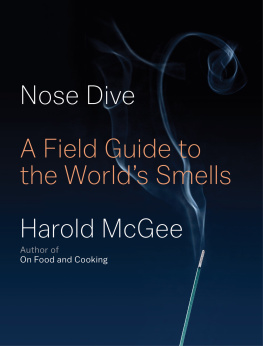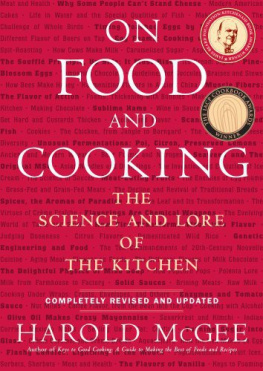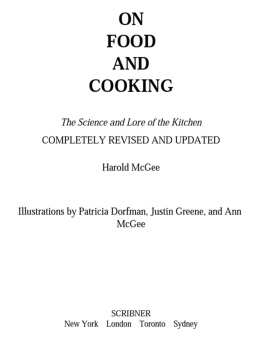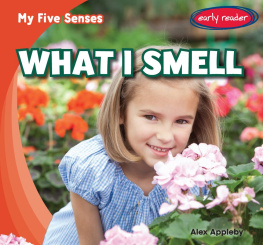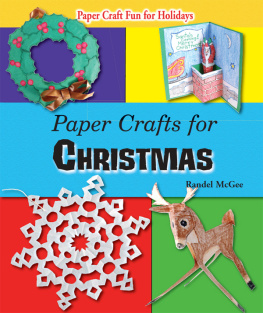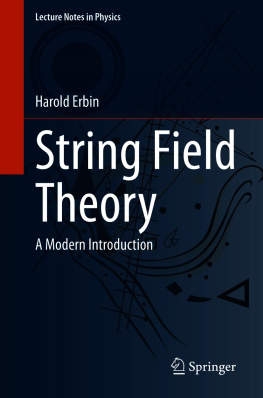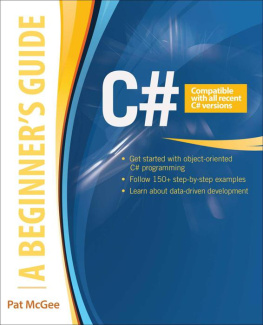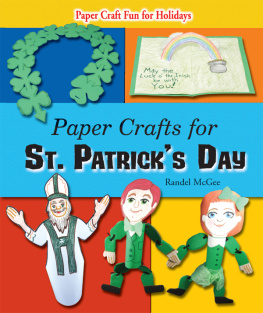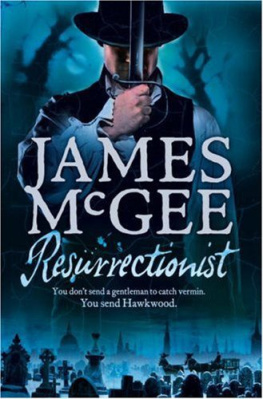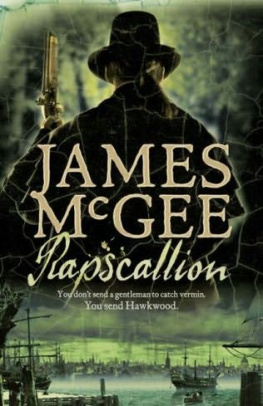Harold Mcgee - Nose Dive: A Field Guide to the Worlds Smells
Here you can read online Harold Mcgee - Nose Dive: A Field Guide to the Worlds Smells full text of the book (entire story) in english for free. Download pdf and epub, get meaning, cover and reviews about this ebook. year: 2020, publisher: Penguin Publishing Group, genre: Home and family. Description of the work, (preface) as well as reviews are available. Best literature library LitArk.com created for fans of good reading and offers a wide selection of genres:
Romance novel
Science fiction
Adventure
Detective
Science
History
Home and family
Prose
Art
Politics
Computer
Non-fiction
Religion
Business
Children
Humor
Choose a favorite category and find really read worthwhile books. Enjoy immersion in the world of imagination, feel the emotions of the characters or learn something new for yourself, make an fascinating discovery.
- Book:Nose Dive: A Field Guide to the Worlds Smells
- Author:
- Publisher:Penguin Publishing Group
- Genre:
- Year:2020
- Rating:3 / 5
- Favourites:Add to favourites
- Your mark:
- 60
- 1
- 2
- 3
- 4
- 5
Nose Dive: A Field Guide to the Worlds Smells: summary, description and annotation
We offer to read an annotation, description, summary or preface (depends on what the author of the book "Nose Dive: A Field Guide to the Worlds Smells" wrote himself). If you haven't found the necessary information about the book — write in the comments, we will try to find it.
Nose Dive: A Field Guide to the Worlds Smells — read online for free the complete book (whole text) full work
Below is the text of the book, divided by pages. System saving the place of the last page read, allows you to conveniently read the book "Nose Dive: A Field Guide to the Worlds Smells" online for free, without having to search again every time where you left off. Put a bookmark, and you can go to the page where you finished reading at any time.
Font size:
Interval:
Bookmark:
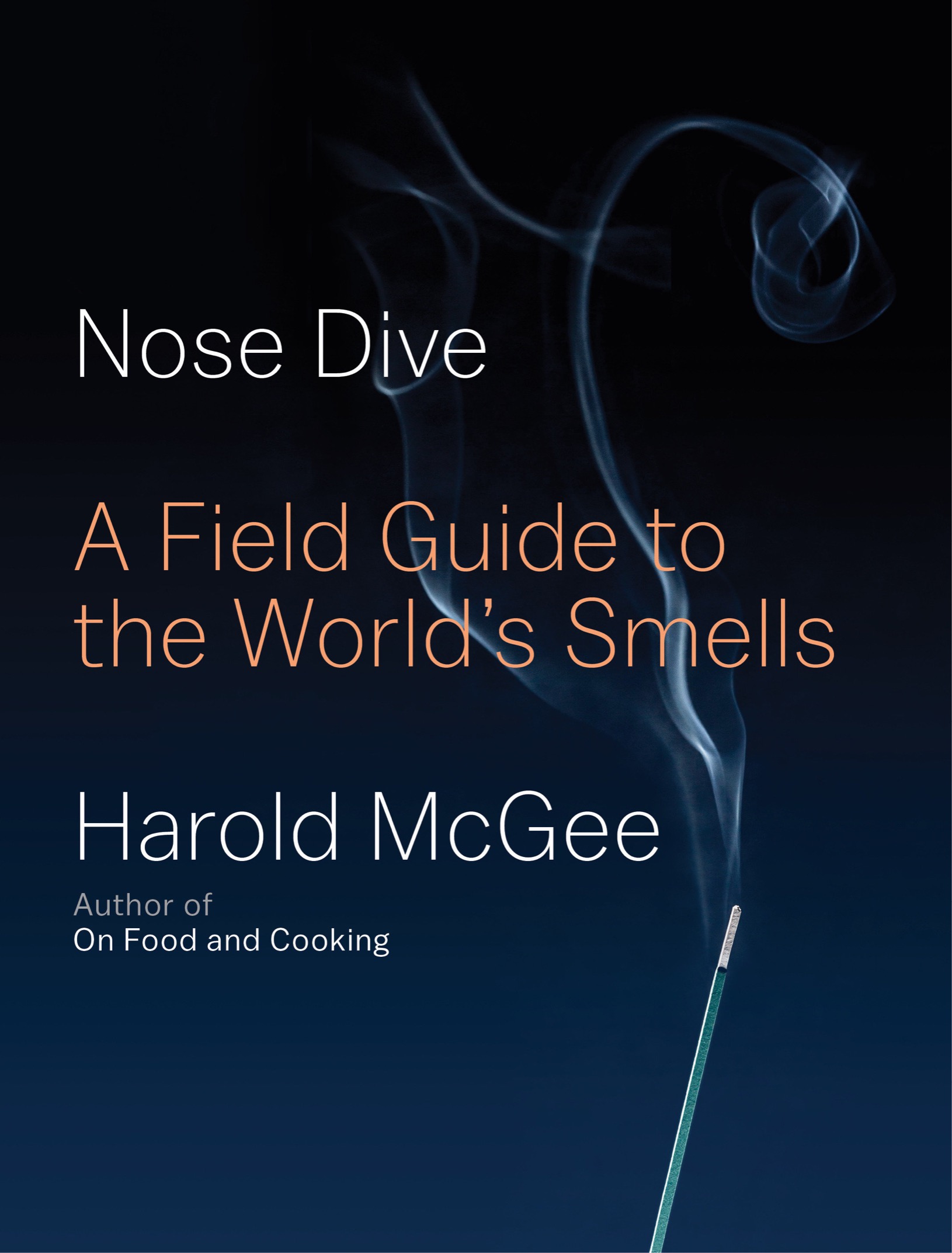
On Food and Cooking: The Science and Lore of the Kitchen
The Curious Cook: More Kitchen Science and Lore
Keys to Good Cooking: A Guide to Making the Best of Foods and Recipes
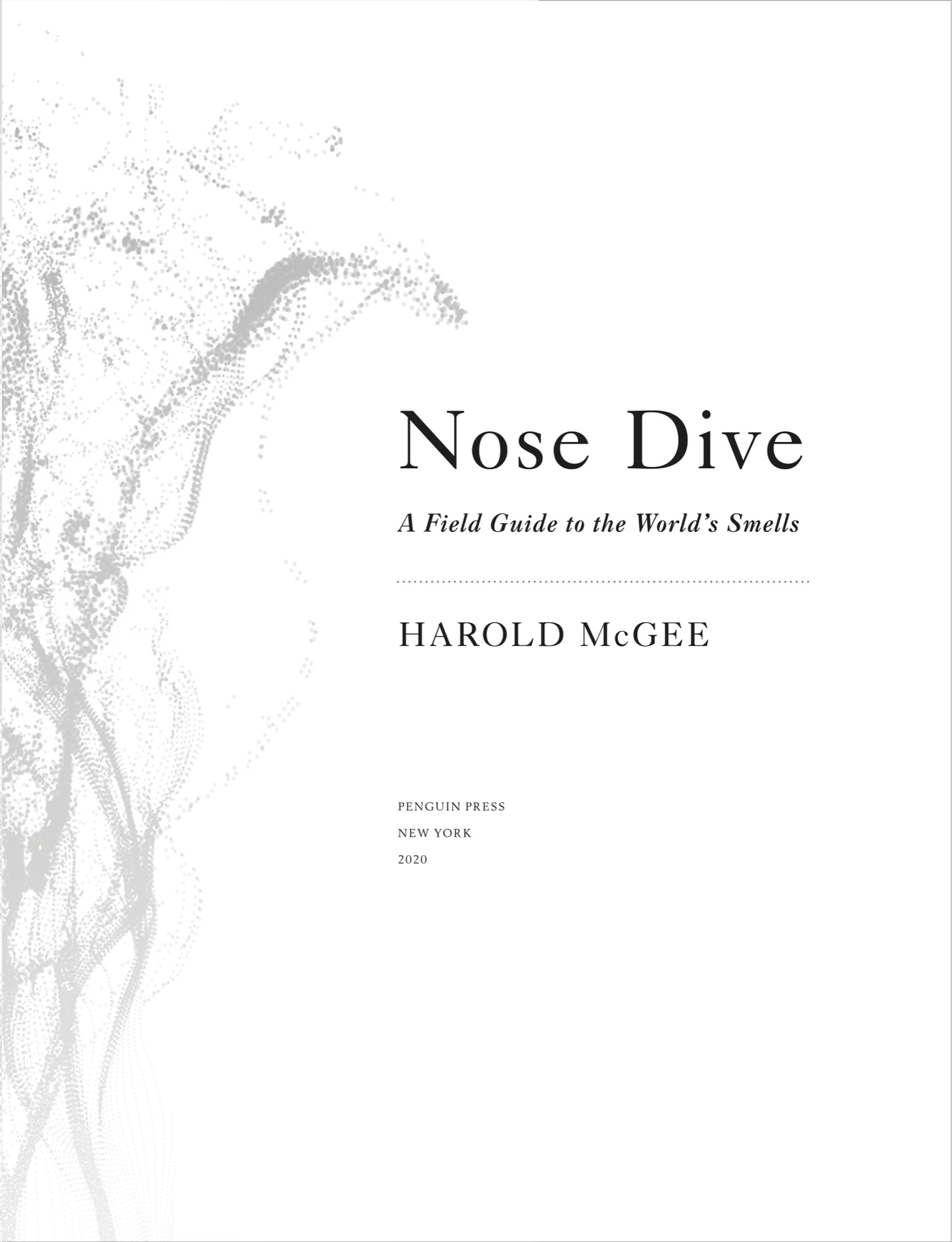
PENGUIN PRESS
An imprint of Penguin Random House LLC
penguinrandomhouse.com
Copyright 2020 by Harold McGee
Penguin supports copyright. Copyright fuels creativity, encourages diverse voices, promotes free speech, and creates a vibrant culture. Thank you for buying an authorized edition of this book and for complying with copyright laws by not reproducing, scanning, or distributing any part of it in any form without permission. You are supporting writers and allowing Penguin to continue to publish books for every reader.
Illustrations of chemical structures by Alice Phung
LIBRARY OF CONG RESS CATALOGING-IN-P UBLICATION DATA
Names: McGee, Harold, author.
Title: Nose dive : a field guide to the worlds smells / Harold McGee.
Description: New York : Penguin Press, 2020. | Includes bibliographical references and index.
Identifiers: LCCN 2020003220 (print) | LCCN 2020003221 (ebook) | ISBN 9781594203954 (hardcover) | ISBN 9781984881878 (ebook)
Subjects: LCSH: Odors. | Smell.
Classification: LCC QP458 .M42 2020 (print) | LCC QP458 (ebook) | DDC 612.8/6dc23
LC record available at https://lccn.loc.gov/2020003220
LC ebook record available at https://lccn.loc.gov/2020003221
Cover image: YS Graphic / Getty Images
pid_prh_5.6.0_c0_r0
To all the chemists past and present whose pursuit of flying molecules made this book possible
N o matter where or how youre reading these words, at this very moment theres a world swirling all around you, and into you, that teems with the makings of delight, disgust, understanding, and wonderment. Its an invisible nimbus of flying molecules: countless specks of matter launched into the air we breathe, whizzing at highway speeds, whose presence we perceive as smells. This book is about those specks and smells, and about making the most of our access to them.
Many fine books have been written on our sense of smell, on the pleasing aromas of food and drinks and perfumes, on the nature of disgust. Here Ive put together something different: a guide to the wide world of smells, nice and not, and the airborne molecular specks that stimulate them. Since the specks are representative bits from throughout the material cosmos, I like to call this wide world the osmocosm, from osme, the ancient Greek for smell or odor, with its inner resonance and hint of wizardly magic. The osmocosm contains multitudesthousands of different molecules at least, possibly thousands of thousands. Theres more to it than even the most sensitive among us can experience. And much or all of it is inaccessible to the many people whose sense of smell has somehow been impaired. But no matter how much of it we happen to notice, were always immersed in the osmocosm. Its a fundamental feature of the world we inhabit. Its well worth exploring, even if only in imagination and thought.
The general term for any airborne molecule is volatile, a word that derives from the Latin for to fly and was first applied centuries ago to birds and butterflies and other winged creatures. It was one of these original volatiles, a flavorful wild bird, that drew me into exploring the world of molecular volatiles. Let me explain how it did, and how I hope youll use this guide to become a smell explorer yourself.
My longtime beat is the science of cooking. Back in 2005, when experimental cooking was the talk of the restaurant industry, I traveled to Spain and England to get a taste of its innovations. The leading avant-garde chefs, the Adris and Rocas and Heston Blumenthal, aspired to give diners an unforgettable meal, with long menus of novel dishes that were variously startling, amusing, baffling, and sometimes delicious. It was a stimulating few days. But my most memorable mouthful came near the end, during a very traditional British lunch with Fergus Henderson and Trevor Gulliver at their London restaurant St. John.
It was early fall, so I ordered grouse, a game bird just then in season that Id never had the chance to taste. It came roasted whole, rare and plainly, on a slice of toast, with a tuft of fresh watercress. I expected to enjoy it, but not that the first bite would leave me speechless. It did. I was completely absorbed, first by intense sensationa meatiness that was almost too strong to be pleasant, and edged with bitternessand then by confused emotion. I was momentarily paralyzed, unable to say a word to my tablemates. They looked at me with some concern, but then Fergus smiled, nodded, and said: Ah, of course. Your first grouse.
Id always been interested in understanding what makes foods delicious, but that experience impressed me like no other with the power of flavor to trigger strong feelingand to persist. That grouse was still in my mouth many hours later as I tried to concentrate on a performance of Shakespeares Tempest.
Another moment several years later impressed me with the power of aroma alone. I had managed to grow what looked like an oversize taste bud on the tip of my tongue, maybe an eighth of an inch across: a good joke for a food writer! Eventually I saw a specialist who advised removing it. He gave me a local anesthetic, snipped it out, then cauterized the wound with an electrical instrument that burns and seals the blood vessels. There was a puff of smoke, and I smelled the typical aroma of beef on a very hot grill, burned but also slightly decomposed. A surprise, but it made perfect sense: it was the aroma of grilled McGee! Another good joke. And as I had that lighthearted thought, I got light-headed, then leaden-limbed, and broke into a cold sweat. The physician quickly reclined the chair, and in a couple of minutes I was fine again, just embarrassed. I had thought that I was taking the experience in stride, even relishing the irony, but my body ambushed me. Another unforgettable moment and smell.
The usual cultural touchstone for connecting flavor with emotion is the morsel of madeleine cake that Marcel Prousts narrator dunks into a cup of linden-blossom tea in the first volume of his novel la recherche du temps perdu, or In Search of Lost Time. That bite surprises the unnamed narrator with a shudder of exquisite pleasure that he eventually traces back to tasting the same combination in idyllic childhood. My shudders werent exactly pleasurable: they seemed more likely to be instinctive warnings. The grouse was so strong and funky that it might have been spoiled; cauterized tongue probably evoked the misery of my tonsillectomy twenty years before. But was that all they meant? I felt there was something else going on.
My ruminations eventually led me to a less celebrated passage of Proust that resonated much more. In the fourth volume, Sodom and Gomorrah, the narrator indulges in a favorite drink and is struck by the sensations it provokes:
The orange squeezed into the water seemed to yield to me, as I drank, the secret life of its ripening growth, its beneficent action upon certain states of that human body which belongs to so different a kingdom, its powerlessness to make that body live, but on the other hand the process of irrigation by which it was able to benefit it, a hundred mysteries revealed by the fruit to my senses, but not at all to my intellect.
Font size:
Interval:
Bookmark:
Similar books «Nose Dive: A Field Guide to the Worlds Smells»
Look at similar books to Nose Dive: A Field Guide to the Worlds Smells. We have selected literature similar in name and meaning in the hope of providing readers with more options to find new, interesting, not yet read works.
Discussion, reviews of the book Nose Dive: A Field Guide to the Worlds Smells and just readers' own opinions. Leave your comments, write what you think about the work, its meaning or the main characters. Specify what exactly you liked and what you didn't like, and why you think so.

